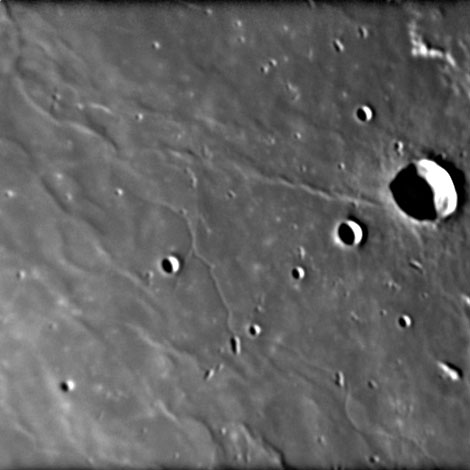Difference between revisions of "October 7, 2004"
| Line 3: | Line 3: | ||
<table width="85%" border="0" align="center" cellpadding="6" cellspacing="2"> | <table width="85%" border="0" align="center" cellpadding="6" cellspacing="2"> | ||
<tr> | <tr> | ||
| − | |||
</tr> | </tr> | ||
</table> | </table> | ||
| Line 24: | Line 23: | ||
<p align="center"><b>Diamondback Rille</b></p> | <p align="center"><b>Diamondback Rille</b></p> | ||
<p align="left">The lunar maria contain many sinuous rilles. All are somewhat difficult to see, and many are best known from orbital photography. One such feature is Diamondback Rille, an informal, astronaut-named guidepost on the approach to the Apollo 11 landing site in southern Mare Tranquillitatis. Images taken by Apollo 8 showed the rille to be flat-floored and about 800 m wide. The rille is partly visible on the <i>Consolidated Lunar Atlas </i>plate [[d5.jpg|D5]], taken with the Catalina Observatory 61" reflector. It is beautifully revealed, however, in Jim Phillips' astonishing image with his 8" refractor. This image must have a resolution of 400-500m: remarkable! The rille starts in an elongated depression considerably off the image to the north, and continues significantly south of the area shown here, but it is narrower to the south. I have applied an aggresive unsharp mark to make the mouseover image, which enhances the rille and the mare ridges. Note the elongated crater southwest of Maskelyne X (diameter 4 km) and elsewhere. These are not volcanic pits but are secondary craters, perhaps from Theophilus.</p> | <p align="left">The lunar maria contain many sinuous rilles. All are somewhat difficult to see, and many are best known from orbital photography. One such feature is Diamondback Rille, an informal, astronaut-named guidepost on the approach to the Apollo 11 landing site in southern Mare Tranquillitatis. Images taken by Apollo 8 showed the rille to be flat-floored and about 800 m wide. The rille is partly visible on the <i>Consolidated Lunar Atlas </i>plate [[d5.jpg|D5]], taken with the Catalina Observatory 61" reflector. It is beautifully revealed, however, in Jim Phillips' astonishing image with his 8" refractor. This image must have a resolution of 400-500m: remarkable! The rille starts in an elongated depression considerably off the image to the north, and continues significantly south of the area shown here, but it is narrower to the south. I have applied an aggresive unsharp mark to make the mouseover image, which enhances the rille and the mare ridges. Note the elongated crater southwest of Maskelyne X (diameter 4 km) and elsewhere. These are not volcanic pits but are secondary craters, perhaps from Theophilus.</p> | ||
| − | <blockquote><p align="right">— [mailto:tychocrater@yahoo.com Chuck Wood]</blockquote> | + | <blockquote> |
| − | <p align="left" | + | <p align="right">— [mailto:tychocrater@yahoo.com Chuck Wood]</blockquote> |
| + | <p align="left"><b>Technical Details:</b><br> | ||
Oct 3, 2004, TMB 8" F/9</p> | Oct 3, 2004, TMB 8" F/9</p> | ||
<p><b>Related Links:</b><br> | <p><b>Related Links:</b><br> | ||
Revision as of 16:57, 17 January 2015
Diamondback Rille
Image Credit: Jim Phillips
|
|
Diamondback Rille The lunar maria contain many sinuous rilles. All are somewhat difficult to see, and many are best known from orbital photography. One such feature is Diamondback Rille, an informal, astronaut-named guidepost on the approach to the Apollo 11 landing site in southern Mare Tranquillitatis. Images taken by Apollo 8 showed the rille to be flat-floored and about 800 m wide. The rille is partly visible on the Consolidated Lunar Atlas plate D5, taken with the Catalina Observatory 61" reflector. It is beautifully revealed, however, in Jim Phillips' astonishing image with his 8" refractor. This image must have a resolution of 400-500m: remarkable! The rille starts in an elongated depression considerably off the image to the north, and continues significantly south of the area shown here, but it is narrower to the south. I have applied an aggresive unsharp mark to make the mouseover image, which enhances the rille and the mare ridges. Note the elongated crater southwest of Maskelyne X (diameter 4 km) and elsewhere. These are not volcanic pits but are secondary craters, perhaps from Theophilus. Technical Details: Related Links: Tomorrow's LPOD: What a Difference a Day Makes |
|
Author & Editor: Technical Consultant: Contact Translator: A service of: |
COMMENTS?
Register, and click on the Discussion tab at the top of the page.




